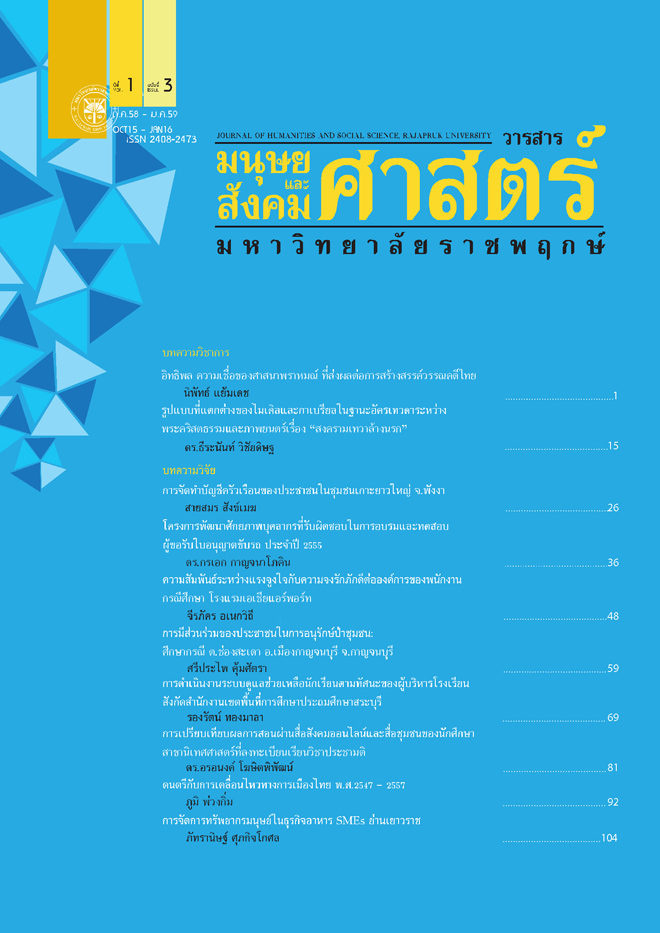The Relationship between Motivation and Organizational Loyalty: A Case Study of Asia Airport Hotel
Main Article Content
Abstract
The purposes of this research were to study the personal factors that affect organizational loyalty of staff and the relationship between motivation and organizational loyalty of staff. The samples used in the study included Asia Airport hotel's staff of 166 people. Instrument was a questionnaire. Accurate content analysis by experts, was taken to trial and tested with confidence coefficient alpha Cronbach was 0.951. The statistics used for data analysis of frequency, Percentage, Standard Deviation, t-test, One-way ANOVA statistical analysis at the significance level of .05 and Pearson’s Correlation Coefficient analysis at the significance level of .01. The research found that personal factors of Asia Airport Hotel included gender, age, job status, qualification period performance and average revenue per month different, loyalty to the organization was not different. Motivation for employees affect loyalty showed the relationship in the same direction. Motivating factors for the success of the job, the recognized accordingly, the nature of the work performed responsibility and the progress in the work overall was moderate. Hygiene factor Policy of the Organization, relations with bosses, salaries and benefits, the working conditions, how the rule and job stability overall in high Level.
Article Details
References
มหาบัณฑิต สาขาการจัดการทั่วไป มหาวิทยาลัยเทคโนโลยีราชมงคลธัญบุรี.
ธนัชพร กบิลฤทธิวัฒน์. (2557). แรงจูงใจที่มีความสัมพันธ์กับความภักดีต่อองค์กรของพนักงานไทยในบริษัทข้ามชาติญี่ปุ่นในเขตกรุงเทพมหานครและปริมณฑล. สารนิพนธ์บริหารธุรกิจมหาบัณฑิต สาขาการจัดการ มหาวิทยาลัยศรีนครินทรวิโรฒ.
วันชัย ศกุนตนาค. (2555). แรงจูงใจในการปฏิบัติงานที่มีความสัมพันธ์กับความผูกพันของพนักงานกลุ่มงาน Service Desk ของธนารแห่งหนึ่ง. สารนิพนธ์บริหารธุรกิจมหาบัณฑิต สาขาวิชาการจัดการ มหาวิทยาลัยศรีนครินทรวิโรฒ.
สุธิดา ม่วงรุ่ง. (2553). ปัจจัยที่มีผลต่อความจงรักภักดีของพนักงานในองค์กร กรณีศึกษาบริษัท ท่า
อากาศยานไทย จากัด (มหาชน). รายงานการค้นคว้าอิสระบริหารธุรกิจมหาบัณฑิต มหาวิทยาลัยเทคโนโลยีราชมงคลธัญบุรี.
สุพัตรา สุภาพ. (2536). เทคนิคการบริหารงานอย่างมีประสิทธิภาพยุคใหม่ “เน้นพฤติกรรมมนุษย์”. กรุงเทพฯ: ธรรมนิติ.
ศิริพงศ์ อินทวดี. (2541). ความสัมพันธ์ระหว่างทัศนคติต่อการประเมินผลการปฏิบัติงาน ทัศนคติ
ต่อรางวัลและความผูกพันต่อองค์การ กรณีศึกษา บริษัทเอกชนแห่งหนึ่ง. วิทยานิพนธ์
ศิลปศาสตรมหาบัณฑิต สาขาจิตวิทยาอุตสาหกรรมและองค์กร มหาวิทยาลัยธรรมศาสตร์.
Hoy. Wayne K. and Rees, Richard. (1974). Subordinate Loyalty to Immediate Superior: A Neglected Concept in the Study of Educational Administration. Sociology of Education. 47: 268 - 275.


